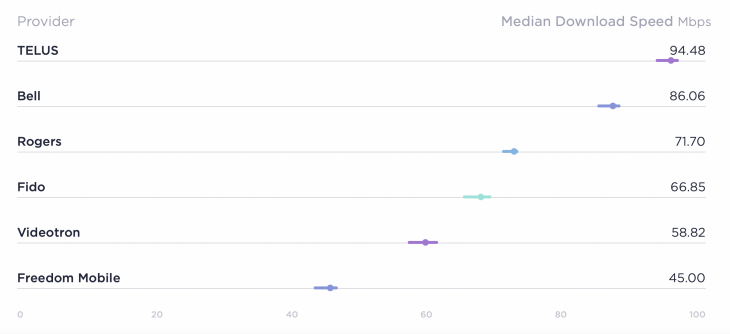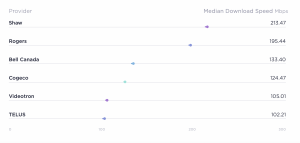
SEATTLE – Telus Communications was the fastest mobile operator of Canada’s top providers in the first quarter of 2022, according to mobile and broadband testing company Ookla.
Ookla’s more recent quarterly report, released today, shows Telus had a median download speed of 94.48 Mbps, which was faster than Bell (86.06 Mbps), Rogers (71.7 Mbps), Fido (66.85 Mbps), Videotron (58.82 Mbps) and Freedom Mobile (45 Mbps). (Please see chart above.)
Freedom meanwhile scored the lowest latency score for Q1 2022. Ookla reported Freedom’s median latency was 18 ms, Rogers and Fido’s median latencies were both 23 ms, Telus and Bell were both 25 ms, and Videotron was 29 ms.
Videotron scored the highest consistency score, with 92.2% of the company’s “results showing at least a 5 Mbps minimum download speed and 1 Mbps minimum upload speed,” the report says. Fido (87%) had the next highest consistency score, followed by Rogers (86.6%), Telus (84.9%), Freedom (84.5%) and Bell (83.6%).
In terms of regional speeds, “Newfoundland and Labrador showed the fastest median mobile download speed in Canada during Q1 2022 at 86.66 Mbps,” the report says. This was followed by Manitoba (81.61 Mbps), Alberta (78.56 Mbps), B.C. (76.97 Mbps), Ontario (76.27 Mbps) Québec (74.59 Mbps), New Brunswick (72.73 Mbps), Saskatchewan (61.15 Mbps), Nova Scotia (58.64 Mbps) and Prince Edward Island (35.82 Mbps).
St. John’s had “the fastest median mobile download speed among Canada’s most populous cities during Q1 2022 at 159.07 Mbps,” according to the report.
Winnipeg was next with a median download speed of 105.4 Mbps, followed by Calgary (97.79 Mbps), Halifax (95.37 Mbps), Toronto (94.71 Mbps), Edmonton (92.21 Mbps), Vancouver (91.97 Mbps), London (90.12 Mbps), Québec City (85.93 Mbps), Montreal (80.96 Mbps) and Ottawa (76.73 Mbps).
Telus had the fastest median download speed (162.47 Mbps) in the country when looking at only the tests taken on a 5G connection, the report says. (Bell had a median 5G download speed of 155.71 Mbps and Rogers of 102.81 Mbps.)
Fixed broadband
For fixed broadband, Ookla’s report shows Shaw was the fastest provider among Canada’s top providers in Q1 2022. Shaw had a median download speed of 213.47 Mbps. Rogers was next with a median download speed of 195.44 Mbps, followed by Bell Canada at 133.4 Mbps, Cogeco at 124.47 Mbps, Videotron at 105.01 Mbps and Telus at 102.21 Mbps. (Please see chart below.)
Bell Canada has the lowest latency amongst the fixed broadband providers at 5 ms. This was followed by Telus at 6 ms, Rogers and Shaw, which were both at 12 ms, Videotron at 13 ms and Cogeco at 14 ms.
There was no top consistency score for fixed broadband this quarter. “In measuring the consistency of each fixed broadband provider’s performance, we found that there was no statistical winner for highest Consistency Score in Canada during Q1 2022,” Ookla’s report says. Consistency scores ranged from 83.5% (Bell Canada) to 89.8% (Rogers).
New Brunswick had the fastest median download speed of Canada’s regions at 152.93 Mbps. Newfoundland and Labrador came next at 150.55 Mbps, followed by B.C. at 146.92 Mbps, Nova Scotia at 127.2 Mbps, Alberta at 120.84 Mbps, Ontario at 105.19 Mbps, Manitoba at 90.43 Mbps, Québec at 90.25 Mbps, Prince Edward Island at 80.44 Mbps and Saskatchewan at 78.54 Mbps.
St. Johns had the fastest median download speed of the country’s most populous cities at 167.64 Mbps. This was followed by Calgary at 159.57 Mbps, Edmonton at 156.35 Mbps, Halifax at 144.39 Mbps, Vancouver at 132.11 Mbps, Toronto at 131.35 Mbps, London at 125.01 Mbps, Winnipeg at 124.25 Mbps, Ottawa at 110 Mbps, Québec City at 109.66 Mbps and Montreal at 73.96 Mbps.

For Ookla’s full Q1 2022 mobile and fixed broadband reports please click here.
Charts borrowed from Ookla’s reports.


